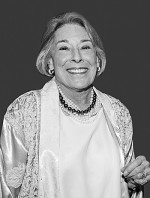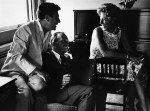Title
When you think chairman of the board, you generally think in rather sober terms. But when Mary Rodgers Guettel, chair of the Juilliard board from 1994 to 2001, got up to address students at convocation or graduation, they would routinely chant “Mary, Mary.” “That’s truly remarkable,” President Joseph W. Polisi notes. “She had a playfulness and an accessibility, and as a person of the stage, she could really respect the hard work of these young artists—and revel in it—and her enthusiasm was infectious.”
Body
Articles about Guettel inevitably describe her multitasking, and little wonder. She’s had careers as a composer, author, screenwriter, TV writer, mother of five, philanthropist, and board chair. Certain phrases also routinely come up when people describe her. Self-effacing. Unfailingly charming. Delightfully funny. Sharp as a tack.
The honoree at this year’s Juilliard gala, on April 30, Guettel began her lifelong immersion in show business at, well, birth. Her father was Richard Rodgers, the legendary Broadway composer. (He was also at Juilliard, from 1920 to 1924, studying music theory.) Young Mary began piano lessons as a child. Did she think of going to Juilliard? “Oh sure,” she said in a recent interview with The Journal, but I knew I couldn’t possibly get in. I played the piano moderately well, but I hated performing.”
In fact, she would have liked to go to a college that was more free-spirited, she said, like Sarah Lawrence, but her parents insisted on Wellesley or Smith. So off she went to Wellesley, also the alma mater of her mother, Dorothy Rodgers. She studied music although they didn’t even teach composition—“they obviously didn’t think women should or could write music,” she said. “There was a lot that I did not learn and that I regret.”
Although her life was charmed in many ways, it wasn’t always easy. “As a famous man’s daughter, I always had an urgent, rebellious desire to retain my own identity at any cost,” she told The New York Times in 1959. Despite the urge to strike out on her own, though, Guettel really did want to compose. During college, she wrote a children’s Christmas song, got someone to decorate a cover, and sold copies for $3 apiece in the lobby of her dorm. Not only did the experience bring enough money to buy Christmas presents, it also earned her some hard-won praise from her father. When she played the song for him, he said, “Well, you obviously know how to write, why don’t you write 12 of these and see if you can get them published?” Which she did.
“That launched me into the world of children’s writing, which I thought was fairly safe,” she said. “Nobody was going to pay attention to me writing children’s songs.” In her senior year at Wellesley, Guettel dropped out in November to get married the next month (“if you weren’t engaged by your senior year, you were dead meat,” she told The Times in 1998), and two months later, in February 1952, her first book of songs, Some of My Best Friends Are Children, was published.
Writing for children also helped Guettel maintain a career during an era notorious for its lack of opportunities for women. In the summer of 1957, Guettel went to Washington, D.C., to see the out-of-town premiere of a new show with a book by her great friend Stephen Sondheim called West Side Story. At a dinner afterward, the show’s composer, Leonard Bernstein, who had just been named music director of the New York Philharmonic, mentioned that he would be taking over the Young People’s Concerts series, which were going to be televised for the first time. “He turned to me and said helplessly, “you know about writing for children, maybe you can be part of this program’,” Guettel recalled. “The thing to do would have been to write to him nervily about how wonderful West Side Story was and timidly mention the job opportunity, but I decided to do the opposite and nervily ask if he was really offering me a job and then mentionWest Side Story as an aside.” Her tactic worked, and she was one of the writing assistants on the show for the 13 years that Bernstein was involved with it. (The experience afforded her, among many other firsts, her first trip inside a temporarily decommissioned men’s bathroom, where they had put the control room at Carnegie Hall, then home to the Philharmonic.)
At the same time, she was busy composing (and raising her five children, the youngest of whom is Tony Award-winning composer Adam Guettel). Her most well-known show is Once Upon a Mattress, the musical farce based on the story of the princess and the pea, which she composed in three weeks and which premiered in 1959 with Carol Burnett starring as the oh-so-sensitive royal (and which launched the young comedienne’s career).
Sondheim was also the connection who helped launch Guettel on her prose career. The famed children’s book editor Ursula Nordstrom asked Sondheim to write a children’s book, Guettel recalled. “He said no, ‘but I have a friend, Mary, who might’.” At her first meeting with the editor, Guettel said, “all I did was talk about all the bad things I’d done as a child,” which turned into The Rotten Book (the tale of a boy doing all sorts of dreadful things and then deciding to be good) which was followed by two immensely popular and funny young adult books about mother-child relationships, Freaky Friday and A Billion for Boris. That experience launched a sideline as a screenwriter (including the first filmed version of Freaky Friday), though that career was short-lived. As she told Juilliard students in her 2001 commencement speech, “The studio can change it, hire other writers to change it, eliminate it, eliminate you—you’re a slave, for God’s sake! Who needs it? I quit.”
Meanwhile, Guettel was continuing to compose (among her efforts were some of the songs on the iconic early 1970s Free to Be … You and Me) and serving on numerous charity boards. And that led, in 1992, to her being asked to join the Juilliard board. Early in her tenure she discovered that most of the trustees had barely explored Juilliard beyond the board room, so she arranged a tour of everything from the costume room to the “room with all the electronics.”
As for highlights of her decade on the Juilliard board, Guettel said, “the whole thing was a highlight!” As she said in that 2001 commencement speech, “Juilliard has become—is—my self-respect, my pride… my life. … Aside from my family, you have made my life more meaningful than I ever dreamed it could be.”






